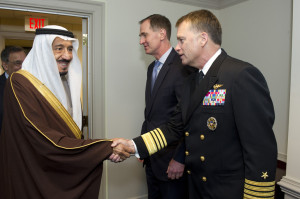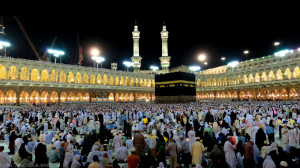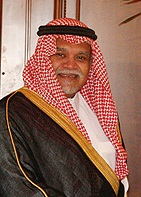Saudi Arabia is internally religiously extreme and pragmatic in its foreign policy, even towards Israel. Yes, it makes sense.
Liberal? Moderate? These are words one would not generally associate with a theocratic kingdom which regularly tramples the rights of foreign workers and women • Only by understanding the actual relationship between the religious establishment and the Royal Court can one understand the complex factors which shape Saudi foreign policy

Voices of openness and moderation have been increasingly emanating from Saudi-controlled media outlets. Alongside voices expressing openness towards Israel in outlets such as al-Sharq al-Awsat, one can also find an aggressive line towards Iran and the ‘Muslim Brotherhood’, especially on the al-Arabiya channel.
Aside from these winks and nods towards Israel and the west in the media, Saudi foreign policy itself has shown signs of moderation. These trends are eyebrow-raising to say the least. After all, we are talking about the extremist Wahhabi kingdom, right? The one with a highly questionable human rights record that’s infamous for its repression of women? Yes, they are indeed one and the same. In the following lines, we will try and explain how these two contradictory trends co-exist in the same country.
You do your thing, I’ll do my thing: the division of labor between the Religious Establishment and the Royal House
It’s true that civil rights are regularly trampled upon in Saudi Arabia itself: women and foreign workers are regularly mistreated, a separate and terrifying “modesty police” enforces the Islamic dress code and the laws of the kingdom are based on Islamic holy law – including executions and beheadings. Indeed, slavery was only formally abolished in Saudi Arabia in 1962.
But this is precisely what separates Saudi Arabia from other Arab countries: repression is limited solely to enforcing Islamic law and goes no further; it does not extend to general political persecution and repression or similar invasions of privacy common, say, to Saddam Hussein’s Iraq. For the most part, the authorities prefer co-opting their enemies rather than crushing them, the Shi’ites being an exception. Until the 2000s, the Saudi internal security forces were actually quite weak; Saudi Arabia does not have what is known as “dawlat mukhabarat”, or the “rule of the security forces” present in Egypt or Syria.
Put differently, Saudi Arabia is a tribal monarchy propped up with modern means and oil wealth, not a modern totalitarian state. In order to understand how this came about, we need to explain the close relationship between the religious establishment and royal Saudi House, in which lies the secret of Saudi survival from the end of the 18th century to the present day.
Saudi Arabia began as an alliance between Wahhabi clerics and the al-Saud family. Wahhabism is a radically conservative religious doctrine developed by Mohammad Ibn Abd al-Wahab in the 18th century. It is part of the Hanbali school of Sunni Islamic jurisprudence. The key fundamental principles were already developed back then, and they continue to guide Wahhabi thought in the 21st century. One of these principles is obedience to “Wali al-Amr” – that is a lawful king who enforces Sharia. Adherence to this principle explains Wahhabi support for the Saudi royal house.
The clerics serve as “providers of religious salvation”; they also maintain a monopoly on Islamic religious doctrine in the country, with the approval of the Saudi royal house. In exchange, the religious establishment grants the royal house a free hand in both foreign and internal affairs in the form of religious backing such as fatwas. This is not a separation of powers so much as a symbiosis which allows both forces to survive alongside each other.

Jihad? No thanks
Surprising as it sounds, there is no causal relationship between Islamic religious conservatism and support for Jihad and terrorism. So in spite of its clear religious extremism, the attitude of the Saudi Kingdom to the use of terrorism is complex. It’s true that one of the Wahhabi fundamental religious principles is an uncompromising war against idolatry and foreign innovation in Islam (“Bid’ah”).
But the “idolatry” and “heresy” which must be fought are not necessarily Judaism or Christianity, but rather phenomena of popular religion, Sufism and Shi’a which were prevalent on the Arabian Peninsula, as well as pilgrimage to graves of holy men and prayers at those sites. In fact, any Muslim who isn’t Wahhabi is defined as a heretic who must reconvert to Islam; even the Sunni Ottoman Empire was declared as heretical in the 19th century by the Wahhabis. But the more the Wahhabis integrated into the state machinery, the more this theoretical principle went by the wayside.
The first significant Saudi move towards Jihad took place in 1979, when the USSR invaded Afghanistan and many Saudis joined the struggle against the Red Army. However, this is not evidence of a Saudi policy in favor of terrorism. Defense of Afghanistan from the “Red Heresy” was considered an all-Islamic issue. Furthermore, it was also a military effort against a foreign military occupier and not terrorism; support for the struggle against Soviet occupation of Afghanistan was present in the West as well as the Islamic world. Although the war and the participation of many Saudis didn’t particularly bother the regime, their attitude changed when they understood that the “Jihad” against the Red Heretics could be aimed at them as well.
A similar process is taking place in connection with the Civil War in Syria. On the one hand, Saudi Arabia is funding the Islamist rebels fighting Assad, their hated enemy. On the other hand, that support is limited to funding only, and they are not involved in commanding or controlling the armed units in action. More than that, most of the Arab world sees the revolt as legitimate, much like the fight in Afghanistan.

Just like during the fighting in Afghanistan, the Saudis also fear a terror backlash today. The Saudi Intelligence head Bindar Bin Sultan is already preparing for the theoretical possibility that the Jihadists will start aiming their weapons in the Saudi direction. In order to preempt the problem, a Saudi royal edict was published forbidding any participation in Jihad outside the borders of Saudi Arabia and even identifying with it; anyone who violates this edict is punishable for up to three years in prison. The edict was meant to prevent a repeat of the 1990s, when Saudis who fought in Afghanistan came back home and tried to cause trouble in the country.
Funding the Syrian rebellion is similar in many ways to diverting money to international terrorism, a point which comes up repeatedly when it comes to the Saudis. Although the kingdom granted money in the 1990s to Islamic indoctrination and charity while turning a blind eye to the amounts that reached Al-Qaeda and other organizations, it did not directly command or direct this terrorist activity. This distinction is important, as the Saudis never had the capability to exercise direct control over terrorist organizations or dictate their policy. This was more a policy of keeping terror away from their borders rather than a positive strategic aim.
This policy ended up harming the Kingdom itself. In spite of the Saudis’ “see no evil” approach to terror funding, when al-Qaeda began launching terrorist attacks against foreigners in the kingdom, the principled approach changed as well. True, the terror was aimed at “foreigners” and not the Royal House itself, but it was seen as a threat against the kingdom, to the point that Saudi Arabia could no longer claim al-Qaeda was an American, not a Saudi problem.
The differences between the Wahhabis and al-Qaeda are far from theoretical: similarly to the Muslim Brotherhood, al-Qaeda also supports toppling the Saudi Kingdom along with all other pro-Western regimes, and they see Jihad as a binding obligation on all Muslims as such. By contrast, the Wahhabis, much like other mainstream Islamic streams of thought, see Jihad as a political act of war that only a lawful ruler may declare with the appropriate support of Islamic clerics. Therefore, the Saudis disagree with Jihad as spontaneous acts of individuals without proper sanction.
Saudi Arabia and the Muslim Brotherhood: The Roots of Hostility
Despite six decades of cooperation between the Muslim Brotherhood and Saudi Arabia, they have recently begun to fall out. Political repression and public denouncements are just a part of this fight. Things reached a critical point in 2012 when the Muslim Brotherhood won the Egyptian presidential elections. But this was not a sudden and unexpected conflict. Rather, it goes back to deep and irreconcilable ideological differences between the two.
The Saudis granted the Brotherhood asylum in the 1950s when the latter was being persecuted in Egypt. This was effectively a Saudi response to Nasser’s irredentism against them and other Arab countries. The Brothers were integrated in the Islamic educational system in Saudi Arabia but were excluded from the Wahhabi hierarchy – that is the official religious establishment. This was reserved solely for the Wahhabi elite. Of course Saudi Arabia closed its eyes to education to violence and intolerance, but it was all essentially part of an unwritten agreement: the guests can deal with Islam – on condition they stay out of internal affairs. When the Brothers violated the agreement or threatened the Wahhabi doctrinal monopoly – everything changed.
The Wahhabi outlook formed long before the Brotherhood existed or before developing ties with the West. So it’s accurate to say that the Wahhabis are pre-modern extreme conservatives, while the Muslim Brothers and related Muslim fundamentalist groups are a kind of religious reaction to the encounter with modernity in its Western form.
The Kingdom actually enforces Sharia, and therefore they have no need for Muslim Brotherhood theories and archetypes for an Islamic state – they already have one. The Brothers oppose monarchy as such and support a constitution and elections, two things which both the rulers and clerics will not hear of. As such, the Saudis see the Brothers as a threat to their political and religious monopoly.
In spite of their conservatism, the Wahhabis see no contradiction between obedience to a ruler who is far from a model of religious piety (including massive shopping sprees in the west and luxury cars) as long as he enforces Sharia. This is a consistent principle: as far as they are concerned, this is not hypocrisy. This as opposed to the Muslim Brothers and other Jihadists who see this double standard as intolerable.
One example among many to these approaches is the response to the Iraqi invasion of Kuwait in 1990. King Fahd didn’t hesitate to invite the US Army to establish themselves in Saudi Arabia, with the religious backing of Wahhabi clerics. This enraged Jihadists and the Brotherhood, who supported Hussein, support which caused a rift between them and the Saudis.

A Kingdom of Contradictions
Proper understanding of Saudi Arabia requires not only thinking out of the box, but also breaking things down into their individual components and understanding their complex interaction: just as rigid religious conservatism doesn’t necessarily lead to Jihadi violence and does not contradict military cooperation with heretics, pragmatism and moderation does not mean tolerance and human rights. The definitions of “extremism” and “moderation” are also often misleading, since one must first define what is extreme – and compared to what. For instance, Iran is far more open and liberal than Saudi Arabia, but the Iranian regime directs terror against Israel while Saudi Arabia does not.
It’s also important to understand that Saudi society is changing even if at its own pace: traditional coffee houses with coffee and Hookahs are disappearing, while more and more upscale coffee houses sporting cappuccino and espresso instead of Arab coffee, with Western music and design are sprouting up. Those with a keen eye will also notice phenomena which didn’t exist in traditional coffee houses: solitary people with coffee and a laptop.
To sum up, while it’s hard to see any actual alliance between Saudi Arabia and Israel on the horizon, we should remember that neither Saudi Arabia nor any of the Gulf States have any tangible territorial conflicts with Israel. Of course, the Palestinian issue was and is a stumbling block in establishing relations, but even this is not usually the whole story, but rather part of a set of narrow interests and policy goals, just as is always the case among Arab states.
English translation by Avi Woolf.
To receive updates on new articles in English, join Mida on Facebook or Twitter or join our mailing list.




Thanks to the writer for this very interesting and insightful article which demonstrates among other things that conservatism in practice is not inherently so intolerant as radical modernism
Jihad? No thanks
Surprising as it sounds,
there is no causal relationship between Islamic religious conservatism
and support for Jihad and terrorism. So in spite of its clear religious
extremism, the attitude of the Saudi Kingdom to the use of terrorism is
complex. It’s true that one of the Wahhabi fundamental religious
principles is an uncompromising war against idolatry and foreign
innovation in Islam (“Bid’ah”)
.I think it Is a very interesting article that prepares international public opinion for the possibility of a Saudi-Israeli alliance based in that both carry an uncompromising war against idolatry that has its roots in the Noahide Laws. In which very clearly says “No to idolatry” that was given to Noah by G-d after the flood and carried on by Abraham when he left Babylonia current Irak towards Canan current Palestine.That will make this alliance possible, according to the Lunbabitch Rebbe.The only thing that can not be rationaly explained is why the Sunni Wahabbis attacked the United States in 911? Under the leadership of Bin Laden with the support of the Saudi Crown that began all this Jihad wars..